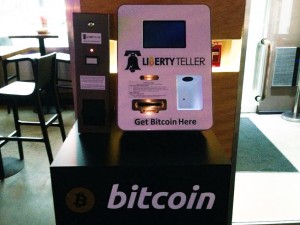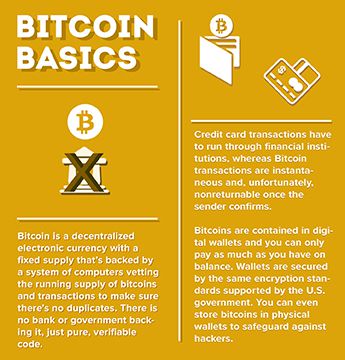Bitcoin, a digital currency created by a person or group of people under the alias Satoshi Nakamoto, is maturing. BitPay, a Bitcoin payment service provider, has over 40,000 businesses and organizations using its service to accept payments, according to its website.

There are four bitcoin ATMs in Boston and Cambridge. Bitcoin clubs and “meetups” in the Greater Boston area strive to generate interest in the relatively new currency. But as Bitcoin matures, it also encounters struggles that call into question the solvency and reliability of the digital currency.
On Oct. 5, the value of Bitcoin shrank from $356 to $290. Yet this was not the first time Bitcoin’s value changed significantly over a short period of time. In 2013, between Dec. 4 and Dec. 7, its value dropped from $1,147 to $694.
The drop, said Mark Williams, lecturer at the Boston University School of Management, validated his cautionary approach to Bitcoin.
“It is highly volatile, meaning that you can buy it today, and it can drop by a lot in a week, which makes it challenging to own it,” he said. “It has no consumer protection, which is really concerning if you are a consumer and you want to use bitcoin, and if bitcoin was stolen from you, you have no recourse. You lose everything. The analogy is used quite a lot that Bitcoin is safer than credit cards, but in reality, it isn’t.”
The Office of Consumer Affairs and Business Regulations and the Massachusetts Division of Banks have issued warnings about Bitcoin’s price volatility, said David Cotney, the Commissioner of the Division of Banks.
The warnings were based on a model of consumer guidance that was developed nationally by state banking regulators and state securities regulators from around the country, he said.
Despite the recent price drop, bitcoin’s value has stabilized, said Anders Brownworth, organizer of the Cambridge Bitcoin Meetup.
“The price is relatively way down from where it was, but it has been a lot more stable,” he said. “Foreign markets affect [bitcoin’s value] more than the U.S. dollar because the U.S. dollar is stable. It is arguable [that] bitcoin is less volatile than some African currencies.”
Brownworth said people are too fixated on the price and on old controversies associated with Bitcoin, such as the implosion of Tokyo-based Bitcoin exchange Mt. Gox. Headed by the CEO and majority stakeholder Mark Karpeles, Mt. Gox was the world’s largest Bitcoin exchange until its collapse into bankruptcy in February when hackers raided the exchange and stole $460 million.
“Some people are seeing the price go up, and that’s just people bidding up a scarce resource and some people may be discouraged by that,” he said. “On the other hand, [there’s] the fall of Mt. Gox. I remember when Mt. Gox went down. Bitcoin didn’t crash. A bad actor went out of business. Mt. Gox never audited books. Mt. Gox disappeared, and it is [was] not a well-capitalized Bitcoin business. They don’t point to fundamental problems with [Bitcoin] technology.”
Bitcoin entrepreneurs echo Brownworth’s claim that price should not be the deciding factor of whether or not to use Bitcoin.

Luke Champine, cofounder of Nebulous Labs, a cryptocurrency-oriented startup, said bitcoin’s value lies in the idea of decentralized money, which trumps worries of price fluctuations.
“The dream of decentralized money is one that so-called ‘cypherpunks’ have held dear for a long time,” he said. “Bitcoin is far from perfect, but it works and people are using it. A lot of people are only in it to play the market, and that accounts for most of the price fluctuation. But there will always be an ideological core to Bitcoin’s user base that will persist, even if the rest of the world abandons it.”
Chris Yim, cofounder of Liberty Teller, which aims to increase Bitcoin liquidity through the use of Bitcoin ATMs, said people should look beyond the price and focus more on the technological benefits of Bitcoin.
“A lot of people who are learning about Bitcoin for the first time are too fixated on the price,” Yim said. “It is important for people to focus on what Bitcoin really is: a stored value. I don’t spend time at all thinking about the price…What I believe is you have this inherent mismatch of merchant and consumer benefits. For merchants, it is really a no-brainer to use Bitcoin. You save 3 percent on every transaction. It’s pretty compelling if you are running a large business or small business.”
Despite the price drops and doomed endeavors such as Mt. Gox and Silk Road, an online marketplace specializing in illicit goods shut down by the FBI in October 2013, Bitcoin has grown. A year ago, 10,000 stores accepted bitcoin, Yim said. That number has since increased to 80,000 stores.
In Cambridge, restaurants such as Veggie Galaxy, Thelonious Monkfish and Moksa accept bitcoin as a form of payment.
Tim Tighe, bartender at Moksa, said the Bitcoin ATM placed in the restaurant has drawn customer interest, but conceded that Bitcoin is still not easily understandable to the average consumer. Payments to Moksa using bitcoin account for less than 1 percent of payment methods, he said.
“It runs directly through the Internet, so sometimes the Internet is running a little slow,” Tighe said. “The bitcoin is not really transferred as quickly as we would like to, but if it’s something that is becoming a constant use, then I am sure the management will figure out a way to correct those problems.”
As more merchants are grappling with the idea of accepting Bitcoin as a means of payment, local college and university bitcoin clubs aim to educate students on Bitcoin and train the next wave of Bitcoin entrepreneurs.
At the Massachusetts Institute of Technology, Bitcoin is almost a culture. Not only does the MIT bookstore accept payments made in Bitcoin, but also $100 worth of bitcoin, most of which was donated, will be disbursed to every MIT undergraduate student, said Dan Elitzer, a second-year MIT master of business administration student and founder of the MIT Bitcoin Club.
“What we are doing at MIT now is building an ecosystem for Bitcoin,” Elitzer said. “I can’t tell you where Bitcoin is going to be in five years, but it is such a powerful and flexible tool.”
Jinglan Wang, a junior at Wellesley College and the cofounder of the Wellesley Bitcoin Club, said one of the reasons for founding the club was to establish women’s presence in emerging technologies.
“Female presence has long been an issue in STEM [Science, Technology, Engineering and Mathematics], finance and business,” she said. “Bitcoin is an intersection of all these fields, and the nascency of Bitcoin gives way to an amazing opportunity for us to become experts before others even know what it is.”
The growth of the digital currency industry has not gone unnoticed by Massachusetts regulators. Cotney said he will be chairing the Emerging Payments Taskforce, a taskforce comprised of nine state regulators who will investigate payment issues, including virtual currencies.
“It’s no surprise that states would be interested in things like security of systems for folks who engage in buying and selling Bitcoin, the money laundering policies and procedures they have in place [and] the consumer protections that exist,” Cotney said. “It’s our job to make sure we adopt the appropriate level of regulation so we don’t stifle innovation.”
Mitchell Dong, a Bitcoin user since February and managing director at Pythagoras Investment Management, said regulators should consider the overall benefits of Bitcoin.
“[Bitcoin is] like the days of the Internet,” he said. “People thought the Internet was going to be used for pornography. But people saw good things, so they continued with the Internet. A $100 bill can be used for terrorists, drugs and prostitution. Bitcoin can be used for positive things, and the positive uses outweigh the negative.”
[rawr]
[/rawr]





Should check out Alt-Options, a biticon options trading company. It was started just this year by two BU undergrads in SMG.